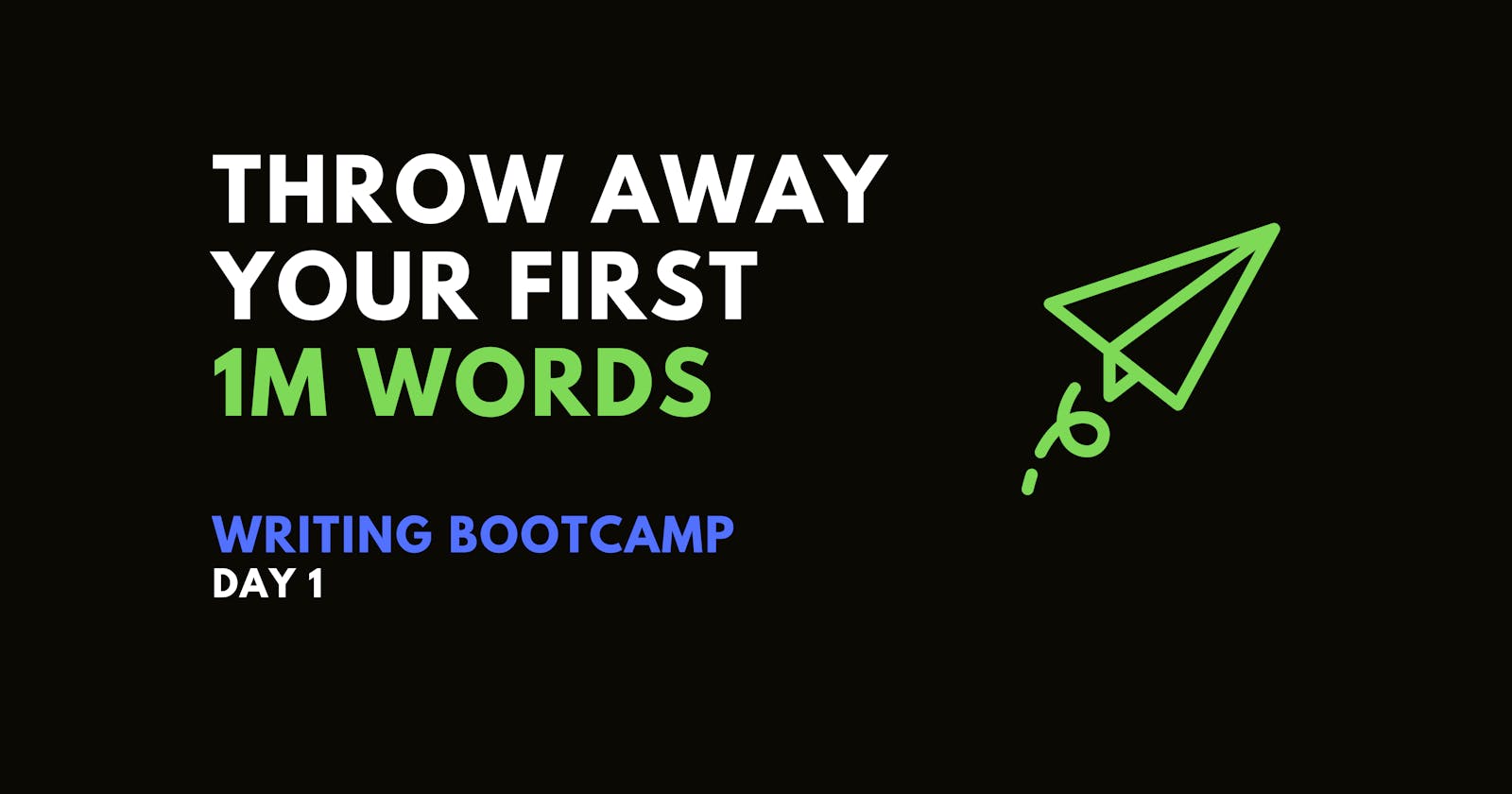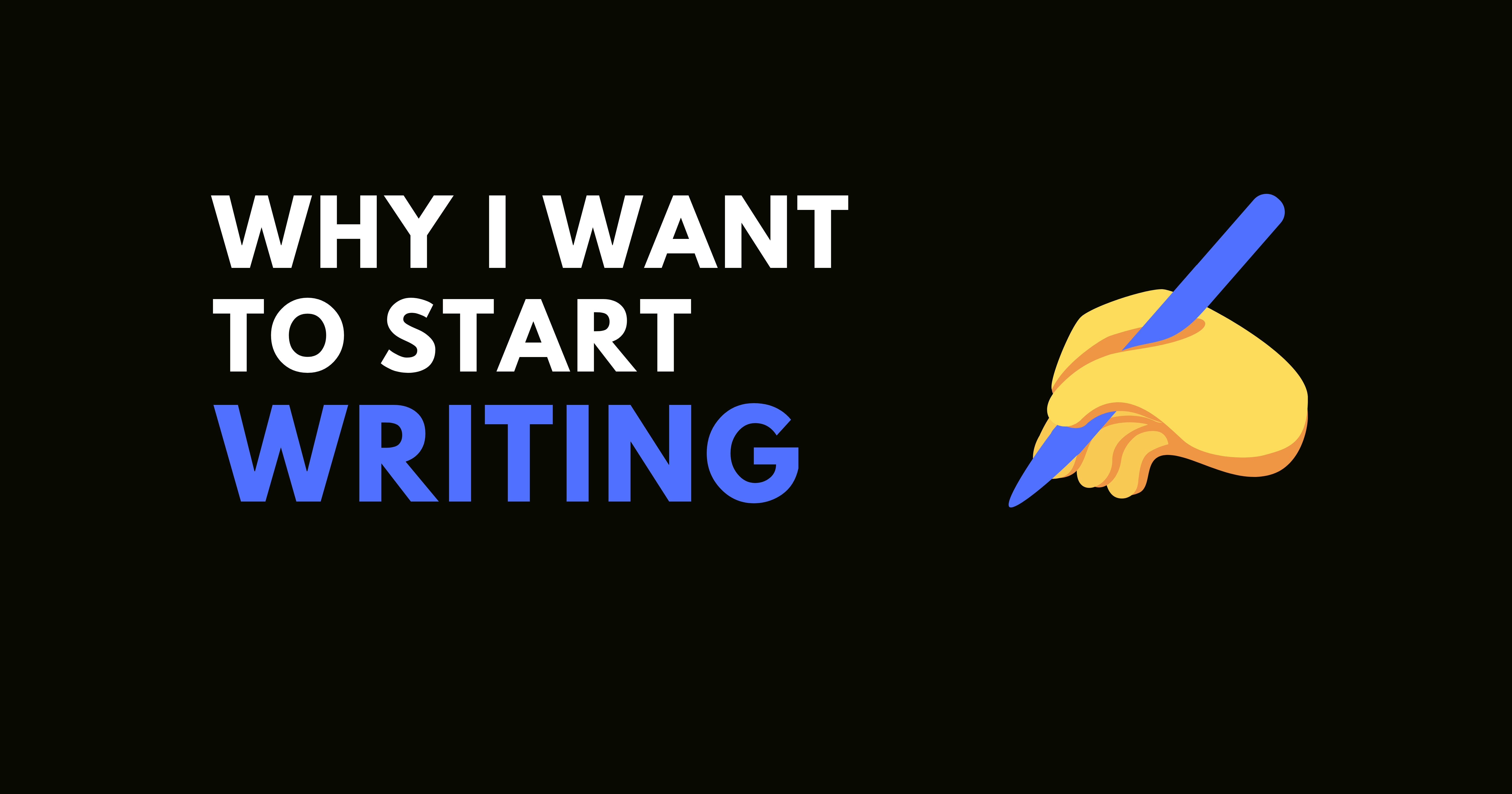Throw Away Your First 1 Million Words - Day 1 of the Hashnode Technical Writing Bootcamp 🚀
Ideas and Tips from Quincy Larson and Edidiong Asikpo
📕 This article is part of the Hashnode Technical Writing Bootcamp series.
In my first blog post, Why I Want to Start Writing, I set a goal for myself to write a blog post after every meeting in the bootcamp as an exercise for building discipline and cosistency.
During the meetings I am taking notes on Notion (I love ❤ it by the way) and in these posts I will share my key takeways. If you missed the meetings this will be a good way to get up to speed with what's happening.
The host is Sam Sycamore, which is doing Content Strategy & Marketing at Hashnode.
The sessions are hosted on Airmeet (cool platform 😎).
Qunicy Larson & Throwing Away Your First 1 Million Words 💸
Meeting the OG 💣
I enrolled in the bootcamp because I wanted to start writing for some time and it seemed like a good nudge in the 'taking action' direction.
But it was such a nice surprise to see that Quincy Larson will say a few words at the beginning. For those unfamiliar with his work, he is the founder of freeCodeCamp, an online platform for teaching people web development. I have heard about it a few years back and have followed him for quite some time. Even did some courses on the platform.
I was fanboying, not gonna lie.
Why Should You Write? 🤔
Quincy talked about the benefits of writing, both as a person and as a professional.
Writing as a Marketing Strategy
The idea of using writing as a marketing strategy was mentioned. Writing articles as part of the organization's online presence can build reputation and an audience.
Communication++
Writing is the most fundational skill for communication
Whatever you do, especially in the information world we live in, being able to communicate clearly and efficiently is a great asset.
Writing for Publications
If you're pretty good at writing and maybe you want to turn it into a career, you could land technical writing jobs for publications. One given example was O'Reilly.
Writing Builds Street Cred
Employers might see your blog and read your articles. If you are writing about topics that interest you or projects that you are working on they will see that you know your shit.
They even might bring it up in interviews which gives you better chances of success.
Being a Beginner is an Opportunity Not a Weakness 💪
The beginner mindset is an asset
Being a beginner should not stop you from writing. Most of us, including me, have this notion that if you are a beginner you should not write about or teach other people a subject. As if only the experts have the right. But that is not true.
It's All About Perspective
Sure, you don't know everything it is to know about the topic, you haven't dug deep enough to get a profund understanding, but that's only one perspective.
The other perspective is to write about it as you're learning, explaining it as you fight in the trenches. The expert can give you lots of insight in the topic, but you as the beginner can give a more relatable approach to other beginners.
The Struggle
You can relate with the struggle of learning the topic because you're doing it right now, so the way you will be explaining it will include the details that other people who want to learn it as well will want to know.
Write things the way you would like them to be explained to you
Be Honest and Own It
Having said that, I want to mention that you should be honest about your level of understanding of the topic both to yourself and to the audience. You shouldn't claim to be an expert when you're not. Own it and learn.
Throw Away Your First 1 Million Words ✈
Throw away your first 1 million words
Quincy said that he heard this from someone else and it stuck with me. Your first articles are going to be garbage, or something close to it. There's no way around that. No one is born a master. You become one.
The more you write the better you get. It's similar to the 10000 hours rule. Spending that amount of time on honing your craft might bring you close to what resembles a master.
Let's do some quick math. A 5 min read article is around 1000 words, that's about how long my first article was. If I want to reach 1M words I would have to write 1000 similar articles.
You would have to write 2 articles of 1000 words each per week for 10 years to reach 1M words
That's intimidating for sure. But also freeing in a sense. It doesn't have to be perfect, you just need to show up and do the work.
Quincy said that he wrote around 500 articles, of varying lenghts, and might have already passed the 1M mark.
Extra Tips 🛠
Get on Social Media
Get a twitter account. Be easy to find online
If you are easy to find you are easy to follow. You don't have to be on all of them, but at least on the main ones.
Same Profile Photo Everywhere
Using the same profile photo everywhere will make it easier for people to recognize you and your work. Be consistent with the way you are presenting yourself online.
Reddit as an Idea Well
If you're looking for an idea for an article you can use Reddit to find one. Do some quick searching on some keywords and see what people are talking about and if they have questions. Maybe an article from you could help somebody.
Edidiong Asikpo & Technical Writing Know-how 📔
The second speaker was Edidiong Asikpo, a former Developer Advocate at Hashnode.
In her talk she covered things like what is actually technical writing, finding your audience, understanding and researching your content and more. Let's get into it.
What Is Technical Writing? 📖
The formal definition:
Technical writing is a type of writing where the author is writing about a particular subject that requires direction, instruction or explaination
In a few words, techincal writing is a way explaining a topic efficienlty and clearly in written form.
Finding Your Audience 🏸
Edidiong talked about the importance of having a good idea who will read your work. This will help you provide them as much value as possible.
She recommended thinking about the following:
- What do they need?
- Where will they be reading?
- When will they be reading?
- Why will they be reading?
- How will they be reading?
Research and Know Your Shit 🔬
It's important to do a thorough research on a subject before writing about it. This was interesting to me becasue it was linked to the "beginner asset" that Quincy talked about.
She didn't dismiss the idea that you can't write as a beginner, but she emphasized the importance of understanding the thing you are explaining.
Don't spread wrong or half digested information.
She gave a quote from Einstein:
If you can't explain it to a six year old, you don't understand it yourself - Albert Einstein
Your Unique Voice 📢
Everybody has a unique voice. The same topic can be explained by 10 people in 10 different ways. Who we are influences how we write.
Don't Plagiarize
When starting out it takes a while to find your voice. Like a painter who is learning. He will first copy the masters until he finds his own style.
Read other people, get inspired by them, but give credit. Always give credit.
Stay Consistent 🍞
She also touches the subject of consistency.
Starting to write is the first step. By doing it repeatedly and constantly you will se results.
Tips for Writing 🛠
She gave some helpful instructins:
Follow a Style Guide
There are guides like those provided here that help you make decisions about your writing style. Stuff like how you should capitalize words in titles. By following a guide and sticking to it you reduce the decisions you need to make and focus on the actual writing.
One Idea Paragraphs
Keep your paragraphs short. One idea per paragraph. It will you make your text easier to digest.
Keep It Simple
Don't use fancy words if you don't need to. The purpose of the article is to get an idea across to the reader, not to impress them with your big vocabulary.
Your First Draft
Read your first draft out loud like you are the reader. It might help you see things you missed when writing.
Break Before Edit
Before editing the draft take a break to clear your mind. Step away from that lump of coal. Then come back a bit later and turn it into a diamond.
Feedback
Get some feedback from friends or experts, depending on the complexity of the topic. An outside pair of eyes is always helpful.
Proofread
Read the final draft. Make sure you don't have spelling mistakes otherwise the Bee will be dissapointed 🐝.
Publish
You're done. Launch it to the moon! 🚀
Homework 📚
At the end of the meeting we got a practical task to do until the next time.
The idea was the following:
Write about your path to technical writing. How did you take the plunge to become a writer?
You can check mine here:
Reach Out 👋
Does any of these ideas resonate with you? Let me know what you think in the comments.
You can find me on Twitter and Github
The icon used in the thumbnail is from here


